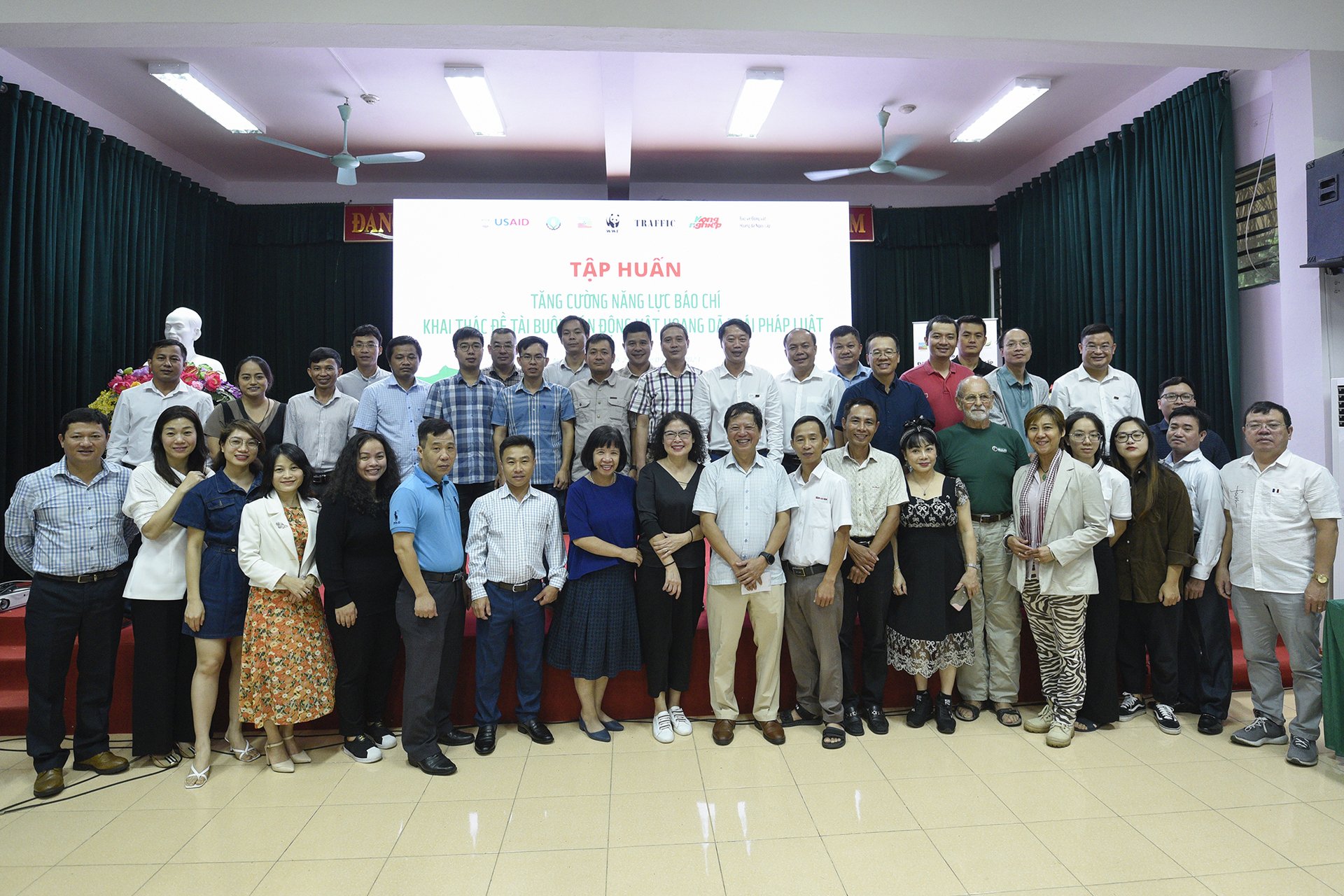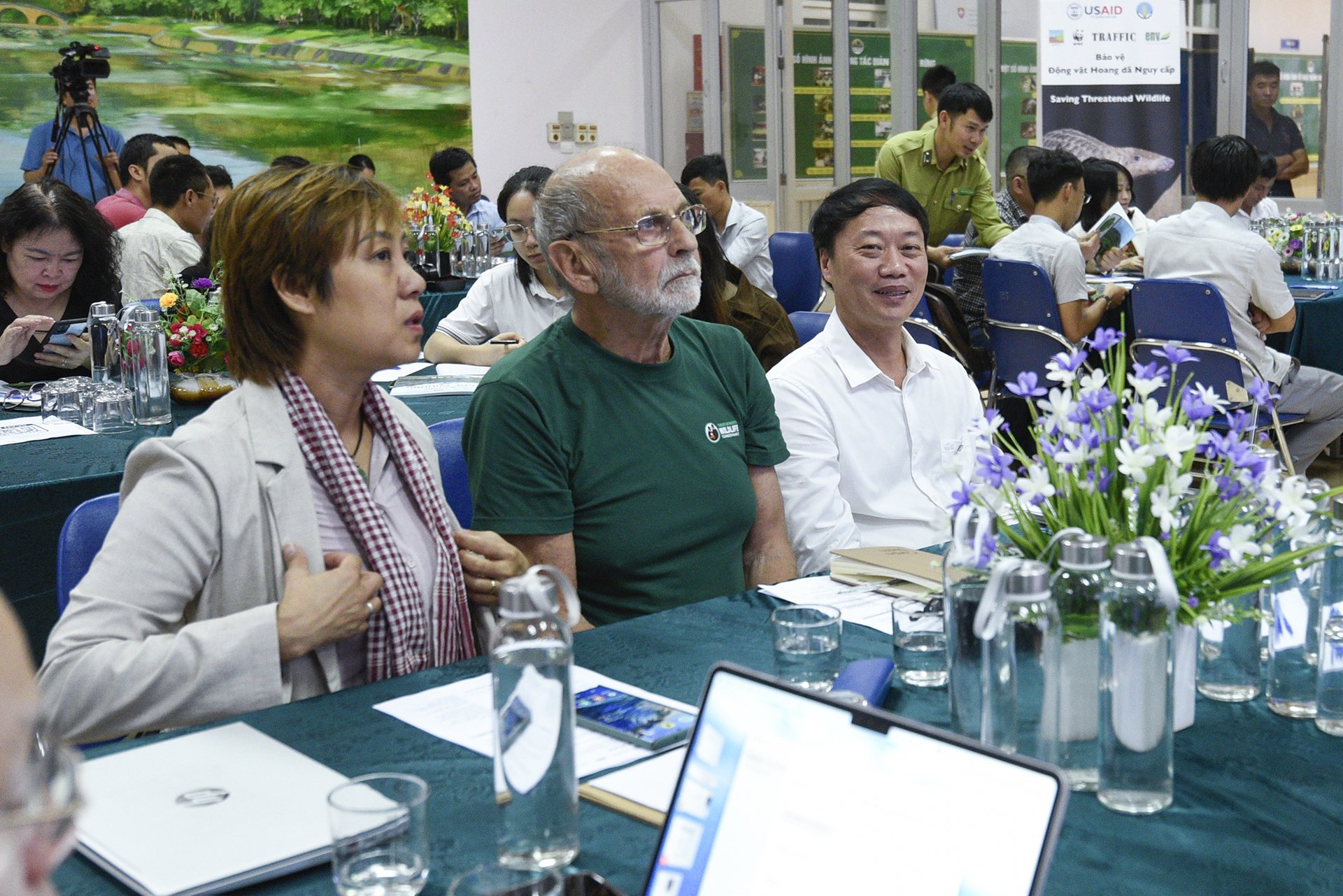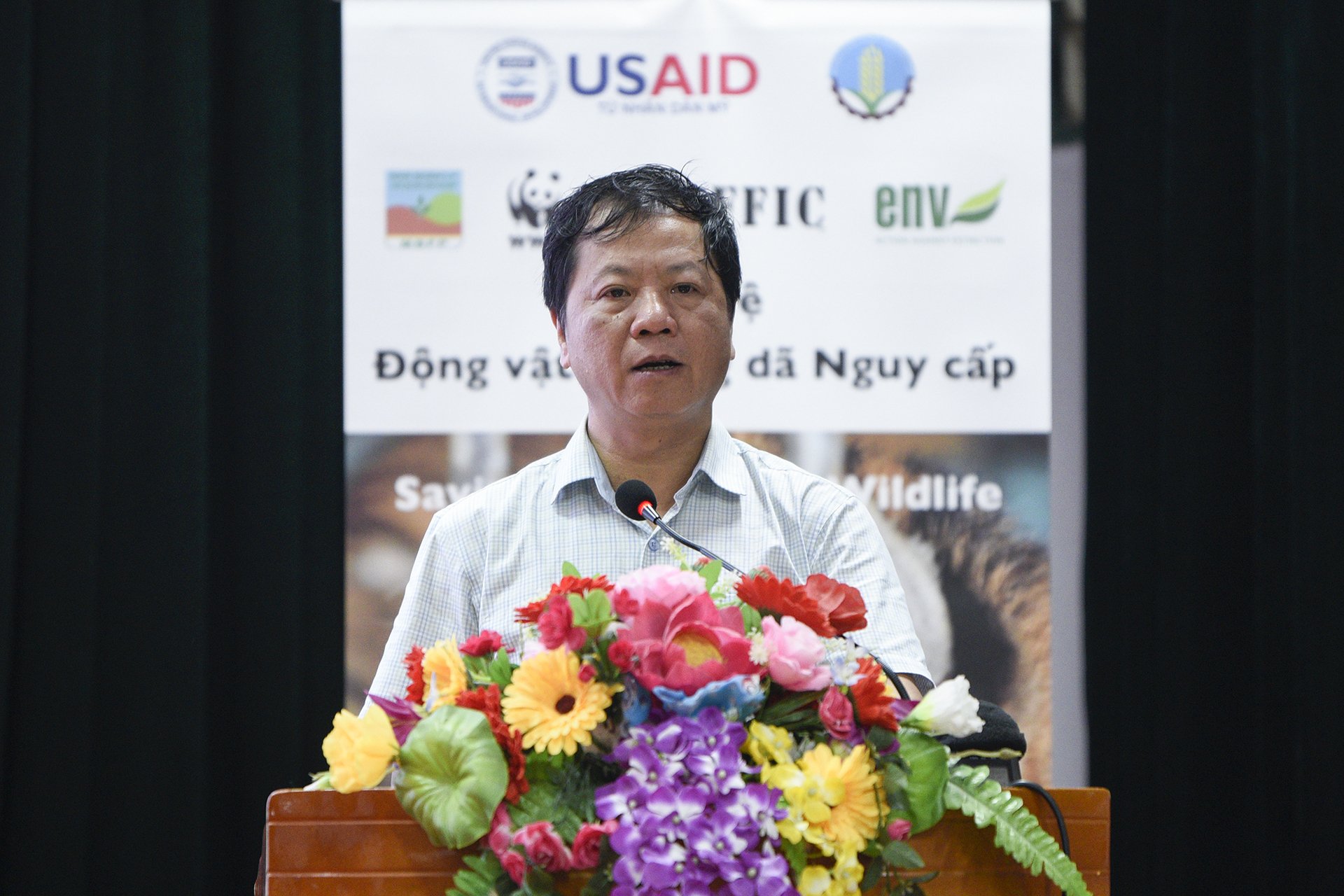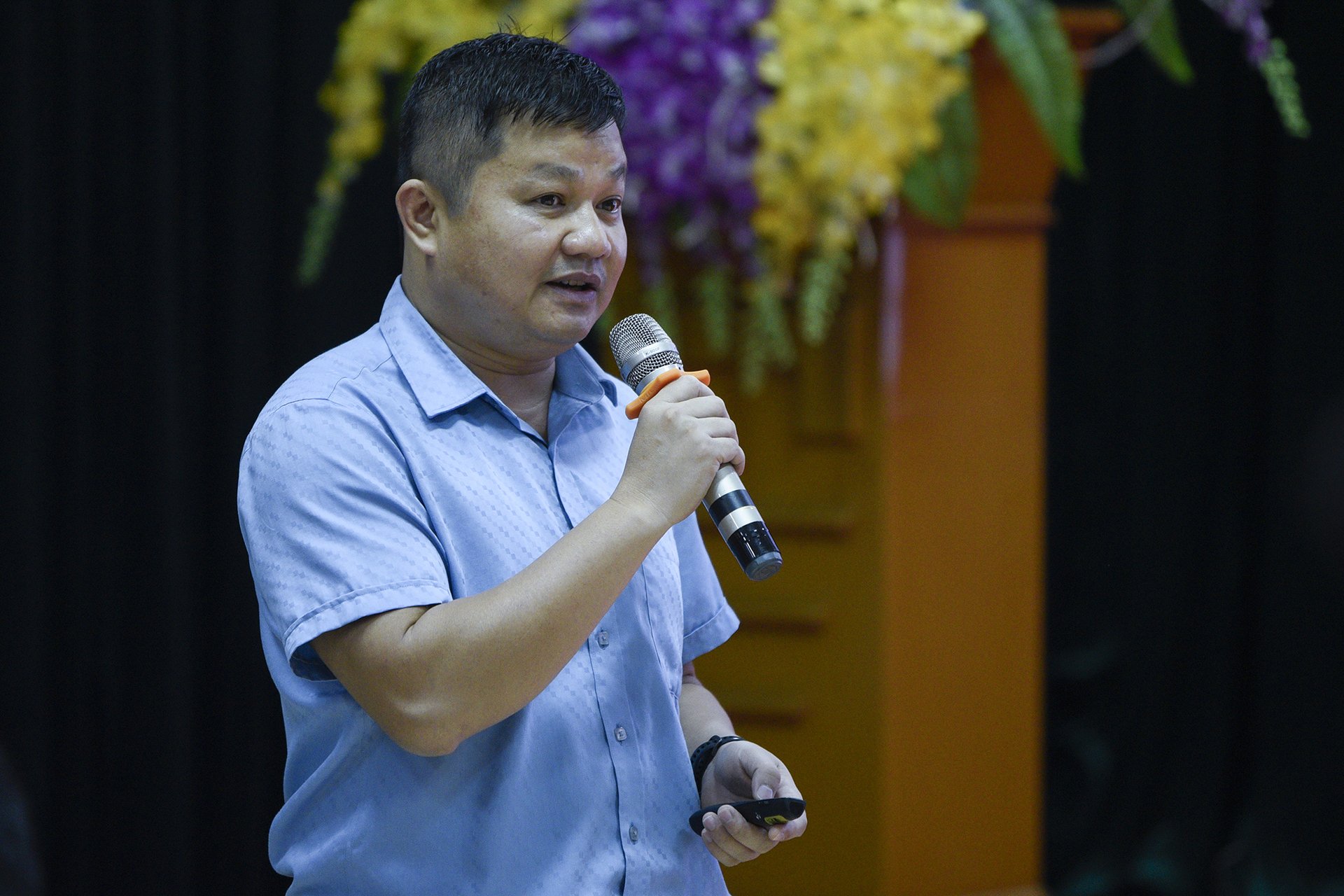May 20, 2025 | 22:54 GMT +7
May 20, 2025 | 22:54 GMT +7
Hotline: 0913.378.918
May 20, 2025 | 22:54 GMT +7
Hotline: 0913.378.918

The training workshop titled "Enhancing media capacity in exploring illegal wildlife trafficking" was held at Cuc Phuong National Park. Photo: Tung Dinh.
The training workshop titled "Enhancing media capacity in exploring illegal wildlife trafficking" was held on September 28 to September 29 at Cuc Phuong National Park in Ninh Binh province.
The training program was organized by the Management Board for Forest Projects, the Vietnam Agriculture Newspaper, and WWF with sponsorship from USAID.
Most notably, the workshop featured the participation and knowledge sharing of leading experts in Vietnam's natural conservation efforts, as well as investigative journalists and over 30 reporters from various central and local media agencies.
The goal of the training workshop was to enhance the media's capacity in investigating, analyzing data, and selecting topics related to combating illegal wildlife trade. The workshop aimed to inspire and engage journalists in the fight against illegal wildlife trafficking.
During the opening speech of the training workshop, Mr. Le Trong Dam, Deputy Editor-in-Chief of the Vietnam Agriculture Newspaper, highlighted that Vietnam is globally recognized as a country with remarkable biodiversity. Accordingly, the Party, central and local governments, and ministries have introduced multiple policies and initiatives over the years to protect and leverage this unique biodiversity.
Additionally, Vietnam has actively and comprehensively participated in the majority of international conventions related to the fight against illegal wildlife trafficking, with an emphasis on endangered species.
However, despite the positive contributions and outcomes in protecting endangered wildlife, Vietnam has gained notoriety as a global hotspot for the illegal trading, hunting, and consumption of wildlife, with numerous cases having been prosecuted by authorities over the years.

Mr. Le Trong Dam, Deputy Editor-in-Chief of the Vietnam Agriculture Newspaper (right-most), emphasized that the participation of journalists and reporters is crucial in the fight against illegal wildlife trafficking. Photo: Tung Dinh.
According to Mr. Le Trong Dam, the government is deeply concerned with the comprehensive fight against illegal wildlife trafficking as Vietnam integrates further into the global economy.
The majority of free trade agreements encompassing Vietnam contain detailed provisions and regulations regarding the protection of endangered wildlife and the conservation of biodiversity.
"The role of journalists and reporters is extremely important in the fight against wildlife crime in Vietnam," Mr. Le Trong Dam emphasized.
As a result, the training workshop has been organized to provide knowledge and information regarding the state of global and local wildlife trafficking, update the relevant legal framework for wildlife crime and its prosecution, and support journalists and reporters in selecting investigative topics related to combating illegal wildlife trade.

Mr. Do Quang Tung, Director of the Forest Project Management Unit, delivered the opening speech. Photo: Tung Dinh.
In his opening remarks, Mr. Do Quang Tung, Director of the Management Board for Forest Projects, expressed his hope that the training workshop will provide journalists with the opportunity to share and exchange experiences with one another. He also proposed suggestions to the workshop organizers and Management Board for Forest Projects to develop solutions for future implementation and collaboration.
Mr. Do Quang Tung emphasized the critical role of the media and journalists in addressing one of the most significant global issues in recent decades: the illegal trade in ivory and rhino horn. This illicit trade activity has had a profound impact on the rhino and elephant populations worldwide. This issue has raised significant concern within the Convention on International Trade in Endangered Species of Wild Fauna and Flora (CITES) and the broader international community.
Providing an overview of the global and Vietnamese wildlife trafficking activities, Mr. Bui Dang Phong, Deputy Director of the Office for the Conservation of Endangered Wildlife Project at WWF Vietnam, highlighted that human activities have accelerated the rate of species extinction by approximately 4,000 times compared to the mass extinction period of dinosaurs. As a result, the world is on the verge of witnessing the sixth mass extinction of wildlife within the next three decades if no interventions are made.
Furthermore, if humanity failts to act promptly and effectively, we will become victims of this impending mass extinction, according to the report.

Mr. Bui Dang Phong, Deputy Director of the Office for the Conservation of Endangered Wildlife Project, WWF Vietnam, providing insights on the state of wildlife trafficking activities. Photo: Tung Dinh.
The illegal trade in wildlife is estimated to possess a market value of approximately 20 billion USD worldwide. Within this illicit commerce, criminal entities are involved in the entire supply chain, encompassing activities such as poaching, transportation, and the sale of illegal wildlife products. Furthermore, this illegal trade is often associated with money laundering, corruption, and the forgery of documentation.
Vietnam, in this context, serves not solely as a marketplace for the procurement and consumption of illegal wildlife products but also as a critical nexus within the global network of wildlife trafficking. This role is particularly pronounced in the illegal trade of ivory, rhino horn, and pangolin scales originating from Africa and subsequently routed to China (EIA, 2021).
In light of this scenario, Mr. Phong has underscored the imperative to intensify awareness campaigns and promote behavioral transformations among consumers.However, these awareness campaigns should embrace innovative content and methodologies.
Furthermore, there is a pressing need to continue research efforts, undertake amendments, and augment legal provisions to further fortify the legislative framework. Concurrently, there should be an augmented focus on gauging societal sentiment and counteracting misconceptions. The steadfast intensification of efforts to combat wildlife trafficking is paramount.
Addressing the gathering on behalf of the organizing body of the training workshop, Mr. Nguyen Van Chinh, Director of Cuc Phuong National Park, reported that the park has effectively collaborated and judiciously harnessed international support resources to facilitate the rescue of endangered and rare wildlife species.
According to Mr. Chinh, it is crucial to recognize that wildlife is a natural heritage. Consequently, our unwavering commitment to conscientiously implement international conventions, to which Vietnam is a signatory, is not a necessity but also epitomizes the resolve and character of the Vietnamese populace in safeguarding the splendor of the natural world for future generations.
The workshop, titled "Enhancing media capacity in exploring illegal wildlife trafficking," constitutes an integral component of the project "Conservation of Endangered Wildlife," which has received funding from the United States Agency for International Development (USAID). The project is owned by the Management Board for Forest Projects, with its execution entrusted to the World Wide Fund for Nature (WWF) and Vietnam Agriculture Newspaper.
Translated by Nguyen Hai Long

(VAN) Japan's grant aid project contributes to capacity building, promoting organic agricultural production, and fostering sustainable community development in Dong Thap province.

(VAN) For years, the CRISPR-Cas9 genome technology has been reshaping genetic engineering, a precision tool to transform everything from agriculture to medicine.

(VAN) Vietnam aims to become a 'leader' in the region in the capacity and managing effectively soil health and crop nutrition.
![Reducing emissions from rice fields: [Part 1] Farming clean rice together](https://t.ex-cdn.com/nongnghiepmoitruong.vn/608w/files/news/2025/05/05/z6509661417740_a647202949c539012a959e841c03e1d3-nongnghiep-143611.jpg)
(VAN) Growing clean rice helps reduce environmental pollution while increasing income, allowing farmers to feel secure in production and remain committed to their fields for the long term.
/2025/05/19/5136-1-144800_230.jpg)
(VAN) The Nghe An Provincial People's Committee has just approved the list of beneficiaries eligible for revenue from the Emission Reductions Payment Agreement (ERPA) in the North Central region for the year 2025.

(VAN) 14 out of 35 domesticated elephants in Dak Lak province have had their living conditions improved, with 11 of them currently participating in the non-riding elephant tourism model.

(VAN) Muong Nhe Nature Reserve hopes that being upgraded to a national park will lay the foundation for forest protection efforts to be carried out in a systematic, modern, and sustainable manner.